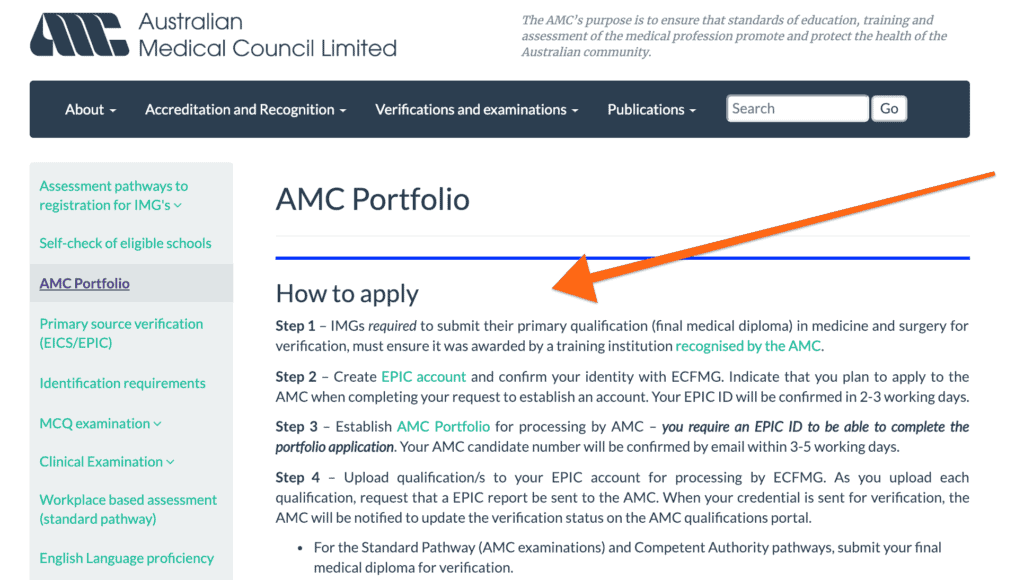Nick and Kim are guest authors who run a blog in the UK called the SavvyIMG. We partnered with them on this post to help answer a question that often arises for IMGs considering either the UK or Australia as a pathway.
Life is full of choices, and for the aspiring IMG, one of the first choices is where to work? This choice is often heavily influenced by the difficulty of the licensing exam. So in this article, we’re comparing the UK and Australian licensing exams, otherwise known as the PLAB and AMC respectively, to help you make a choice.
Questions about how PLAB impacts on the AMC examination process in Australia are some of the most common questions we get here at AdvanceMed. So we invited our guest authors Drs Nick and Kimberly Tan to collaborate with us on this post.
So what factors should an IMG consider when contemplating which exam to take? These are the ones that we think are important and we’ll explain each in more detail below:
- Eligibility requirements
- Exam format
- Pass rates
- Fees
- Test locations and dates
- Maximum number of attempts allowed
- Preparation time
- Level of difficulty
- Job prospects
So let’s dig deeper into each of these factors.
Eligibility requirements
Before you can think about booking one of these exams, you’ll first need to meet the eligibility requirements. The requirements for the 2 exams are listed below:
| PLAB | AMC |
| Acceptable medical degree (Primary Medical Qualification or PMQ)Verification not required to book PLAB 1Proof of English Proficiency which can be one of the following:IELTS Academic – overall score of 7.5 with a minimum of 7.0 in each sectionOET Medicine – Grade B or score of 350 in all sectionsPMQ was taught in English (this one is quite complex, you can read more about it here) Internship is NOT a requirement to sit PLAB. | ECFMG/EPIC verified medical degree (Primary Medical Qualification or PMQ) Proof of English proficiency is not required to sit the AMC, however it is required later on as part of your application for AMC registration.Internship is also not required to sit the AMC, however it is a requirement for provisional registration that you prove that you completed an internship in your own country. (This can be a particularly confusing point for more on this issue check out this post. |
Source: General Medical Council (2020). How do you book or cancel a place [for PLAB 1]? [Link] [Accessed 10 Mar. 2020]. Australian Medical Council (2020). AMC Portfolio [Link][Accessed 10 Mar. 2020]
Exam format
Both exams consist of 2 parts: a multiple choice test, and a practical exam.
| PLAB | AMC | |
| Multiple choice test | PLAB 1 Paper-based written test with 180 questions over 3 hours | AMC MCQ examination Computer-based test with 150 questions over 3.5 hours |
| Practical exam | PLAB 2 18 stations, each 8 minutes long | AMC Clinical examination 20 stations over 3 hours and 20 minutes |
Pass rates
In general, PLAB has quite good pass rates. More than two thirds of IMGs pass both exams.
PLAB
| Year | PLAB 1 | PLAB 2 |
| 2014 | 63% | 65% |
| 2015 | 69% | 68% |
| 2016 | 72% | 73% |
| 2017 | 76% | 79% |
| 2018 | 69% | 66% |
Source: General Medical Council (2020). Recent pass rates for PLAB 1 and PLAB 2. [online] [Link] [Accessed 10 Mar. 2020].
AMC
The pass rates for AMC are lower than PLAB, especially for the clinical exam, so IMGs should be prepared for potentially multiple attempts. This will require a larger investment.
| Year | AMC MCQ | AMC Clinical exam |
| 2015 | 56% | 30% |
| 2016 | 60% | 29% |
| 2017 | 58% | 28% |
| 2018 | 64% | 29% |
| 2019 | 63% | 27% |
Source: Australian Medical Council (2020). Annual Reports. [Link] [Accessed 10 Mar. 2020].
It is worth noting that there is an alternate option to the AMC Clinical exam called the workplace based assessment pathway. This pathway is only open to IMG doctors who are successfully employed at one of ten sites accredited by the AMC for this purpose in Australia. The rates of completion for this pathway are significantly better at around 99%.
Fees
The AMC is significantly more expensive than PLAB 1. Given the low pass rates and expensive fees, we would only recommend sitting for the AMC after very extensive preparation.
| PLAB | AMC | |
| Multiple choice test | PLAB 1AUD 467 (£ 235) until 31 March 2020 AUD 474 (£ 239) from 1 April 202 | AMC MCQ examinationAUD 2,720(£ 1,366) |
| Practical exam | PLAB 2AUD 1,708 (£ 860) until 31 March 2020AUD 1,738 (£ 875) from 1 April 2020 | AMC Clinical examinationAUD 3,530(£ 1,772) |
Source: General Medical Council (2020). Fees and funding [Link] Australian Medical Council (2020). Fees and charges [Link] [Accessed 10 Mar. 2020].
Test locations and dates
The first parts of both PLAB and AMC are available worldwide, however PLAB 1 is only held a maximum of 4 times per year whilst the AMC MCQ is held on multiple dates every month.
The practical exam of both PLAB and AMC are only available in their respective countries. There is currently no option to take PLAB 2 outside of the UK, or to take the AMC Clinical examination outside of Australia.
| PLAB | AMC | |
| Multiple choice test | PLAB 1 Available 4 times per year worldwide. View the dates and locations here | AMC MCQ examination Available on multiple dates every month worldwide. View the dates hereView the locations here |
| Practical exam | PLAB 2 Available on multiple dates every month in the UK only. Dates can only be viewed on your GMC online account once you have passed PLAB 1. | AMC Clinical examination Available on multiple dates every month in Australia only. Dates are released monthly, view them here |
Correct as of March 10, 2020
Maximum number of attempts
There is a limit on the number of times you can attempt PLAB. You have a maximum of 5 attempts for both PLAB 1 and PLAB 2, however after the 4th attempt there are quite a few hurdles to overcome before you will be allowed your 5th and final attempt. You can read more about this here on the GMC website.
If you fail your final 5th attempt at PLAB 1 or 2, you will no longer be able to gain GMC registration and cannot work as a doctor in the UK.
There is no limit on the number of times you attempt any part of the AMC.
| PLAB | AMC | |
| Multiple choice test | PLAB 1 5 | AMC MCQ examination Unlimited |
| Practical exam | PLAB 2 5 | AMC Clinical examination Unlimited |
Level of difficulty
PLAB is set at the level of a doctor who has graduated from medical school and completed one year of internship, however internship is not a requirement to sit the exam.
AMC is set at the level of a doctor who has just graduated from an Australian medical school, however despite the supposedly lower level of difficulty, the AMC has a much lower pass rate compared to the PLAB.
Preparation time
Since both these exams represent a large investment for IMGs, with the AMC more so than PLAB, it would be wise to dedicate enough time for preparation.
These are the times that are recommended when preparing for these exams. Keep in mind that the shorter times are suitable if you do not work while preparing for the exam, and the longer times are for if you work while preparing.
| PLAB | AMC | |
| Multiple choice test | PLAB 1 1.5 – 4 months | AMC MCQ examination 3 months to 1 year |
| Practical exam | PLAB 2 1.5 – 4 months | AMC Clinical examination 3 months to 1 year |
Job prospects
PLAB
Once you have gained registration with the medical authority in the UK, the General Medical Council (GMC), you will be able to apply for jobs that are suitable to your previous experience and qualifications.
As of October 2019, all medical jobs were included in the UK Shortage Occupation List. This means that IMGs will be given equal opportunity for training and non-training jobs, and UK graduates and UK/EU nationals will no longer be given first priority.
So provided you work well on your CV, job application and interview skills, the doors are pretty much open.
This is an incredible opportunity for IMGs that we write about more in this article: 9 ways the new Shortage Occupation List affects IMGs dreaming of UK specialty training.
AMC
The process for obtaining work in Australia via the AMC Standards Pathway is a bit different. You must be offered employment first and you will then be able to gain a conditional form of registration with the Medical Board. You are essentially required to work for 12 months to prove that you meet a certain level of safety and competency. However, you can actually start this process after obtaining the AMC Part 1 examination and don’t need to wait for your Part 2.
The situation for IMG doctors in Australia who pursue the AMC Standard Pathway process is less positive than for the UK. Good data is not kept but there are likely to be thousands of doctors who have completed the AMC Part 1 still waiting for a job opportunity and hundreds who have completed both Parts 1 and 2, similarly vying for the limited number of posts that are advertised where IMG doctors can apply for provisional and conditional positions.
Generally the employers will only advertise these positions when they have exhausted the candidate pool for doctors who already have general registration.
This all may sound a bit gloomy. But its important to understand that hundreds of IMG doctors do still make it through this journey each year in Australia. And once you do obtain general registration the picture improves significantly.
Once you have completed your provisional year and completed both the AMC Part 1 and 2 you are permitted to obtain general registration. Your job prospects at this point are much better and you will likely be able to obtain a training position. However, this may not be in the particular area you are most interested in. Like most other places positions in areas such as surgery and anaesthesia are highly competitive whereas it is generally easier to get into specialty training programs in areas such as emergency medicine, general practice and psychiatry.
There is also the small chance that you may be overlooked in favour of another suitable candidate who has Australian citizenship or permanent residency. However, once you have worked for a while in Australia as a doctor you can usually apply for permanent residency yourself.
Summary
Exams make up just one part of the IMG journey. This article has compared some of the major factors that may influence your decision and here are some take home points for each factor:
- Eligibility requirements: You must provide proof of English proficiency before you can book PLAB 1. You must have your medical degree verified first before you can book AMC MCQ.
- Exam format: Both exams have a multiple-choice test and a practical component. PLAB 1 is a written exam while AMC MCQ is a computer-based test. Both PLAB and AMC have a practical exam.
- Pass rates: AMC pass rates are lower than PLAB, particularly for the practical exam.
- Fees: AMC is significantly more expensive compared to PLAB.
- Test locations and dates: PLAB 1 has very few available dates throughout the year. AMC MCQ is available on multiple dates each month. The practical exam of both AMC and PLAB can only be taken in their respective countries.
- Maximum number of attempts: There is a limit to the number of times you can take PLAB (maximum of 5), while there is no limit for the AMC.
- Preparation time: Since AMC has lower pass rates, preparation time is longer compared to PLAB.
- Level of difficulty: PLAB is actually set at a higher level as it is designed for those who have completed internship, while AMC is for new medical graduates.
- Job prospects: Recent changes in UK immigration law means that the UK currently has its doors open to IMGs. Prospects in Australia are more difficult for IMGs but not impossible.
Final Thought
Most IMG doctors are not just seeking to work abroad anywhere. Many have personal reasons for choosing one particular country over another. Having read through all of the above you may be reconsidering your choices. Or you may now be considering a more complicated plan to ultimately work in country X by first working in country Y.
At the end of the day if you have a definite preference for a certain country then it likely still makes sense to take the direct route for that country.
Now that you’ve had a chance to compare the 2, which exam do you think you’ll take?
If you would like to know more about the process of working in the UK we recommend checking out Nick and Kim’s blog thesavvyimg
Related Questions.
Question. Is the PLAB A Route to Working in Australia?
Answer. Yes. But only if you fully complete all steps of the PLAB including working 12 months supervised. Read more here.



